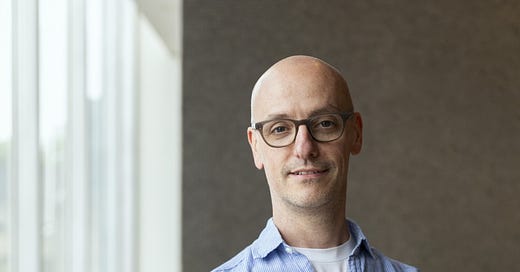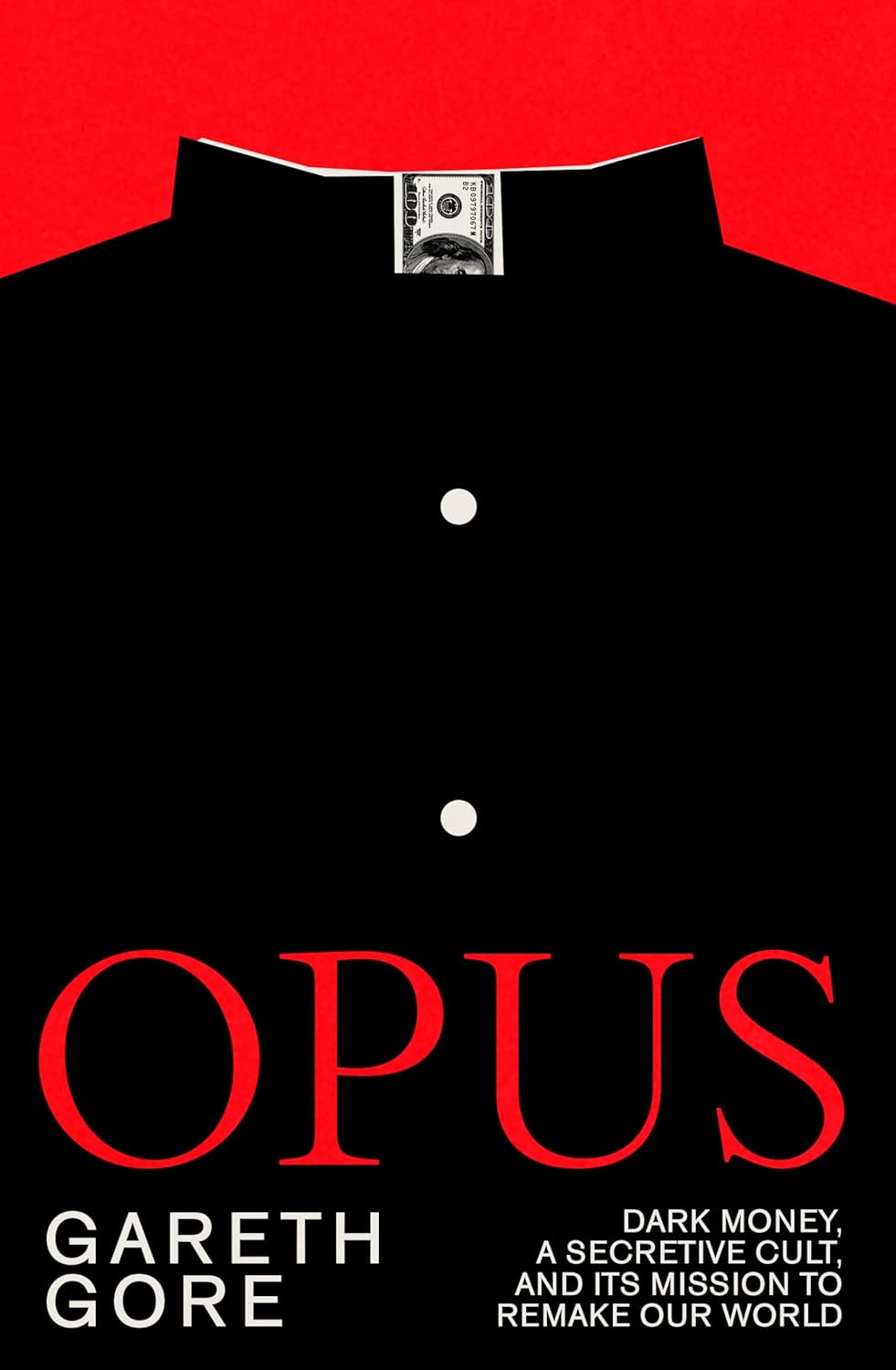Dark money, a secretive cult and the US election
Journalist Gareth Gore talks about his new book on Opus Dei - plus, Democracy for Sale is going to court
It’s a big week for Democracy for Sale. I’m not talking about Bloomberg’s excellent follow-up yesterday evening on our recent story about the lobbyist for Chinese fast fashion firm Shein working as advisor to chancellor Rachel Reeves.
Nor am I talking about the UK budget, or the forthcoming US election. (Although more on that very soon.)
What I am talking about is a court case that’s being heard later this week.
Back in July, we told you that we were battling the government to release important documents about a coal mine in Cumbria that Michael Gove had approved.
Labour has since scrapped Whitehaven but the evidence and rationale behind the original decision are still being kept secret.
We believe there is significant public interest in knowing what steer - and by whom - Gove was given before he gave the go-ahead for a new coal mine.
We even have former Conservative energy minister Chris Skidmore as a witness on our side.
On Friday morning, we will be in a First Tier Tribunal against the government to force the disclosure of this important information. We are being represented by Peter Lockley of 11KBW and Sahil Kher from Kingsley Napley.
Will keep you posted on the outcome!
Like many of you, I've been rather obsessively following the US election. What happens next week will have a huge impact far beyond North America.
The 2024 election is on track to be the most expensive ever, with at least $15.9 billion in campaign spending.
One issue that has received comparatively little coverage is how ultraconservative Christians have been funnelling money into Donald Trump’s Republican party.
When I reported from the US during the 2016 presidential election, I often met Christians who said they couldn’t vote for Trump on moral grounds. Now evangelicals are some of Trump’s biggest supporters.
One group in particular has become increasingly influential: Opus Dei.
The secretive Catholic sect was once best known for inspiring the Da Vinci Code but more recently it has played a pivotal role in the conservative takeover of the US Supreme Court.
Opus Dei acolyte Leonard Leo - who runs a dark money fund with a war-chest of over $1billion - has put millions into a shadowy network designed to help Trump contest Tuesday’s result if he loses.
So when I recently read a fascinating new book, Opus: Dark money, a secretive cult and its mission to remake our world, by the financial journalist Gareth Gore, I thought it would be good to invite him onto the newsletter to tell us all about it.
PETER GEOGHEGAN: Thanks for coming on Democracy for Sale, Gareth. Let’s start at the beginning. Where did the idea for the book come from?
GARETH GORE: I never set out to write a book about Opus Dei – in fact, I fell into this story completely by accident. What began as a bunch of stories about a group of disgruntled investors who had lost everything in the collapse of a Spanish high-street bank suddenly took a completely unexpected turn, when I got a tipoff that the bank’s largest shareholder had deep connections to a secretive Catholic group. At that point I fell down a rabbit hole, out of which I am yet to emerge!
A critical turning point came when I discovered a document in the archives one day that linked the bank to the financing of a whole network of so-called ‘hospitality schools’ around the world that had been used to entrap teenage girls into a life of servitude. Up until that point, I had been planning on writing the story of the rise and fall of this Spanish bank, and its links to Opus Dei. But it suddenly became clear to me that there was a much bigger story to be told.
PETER: Opus Dei is notoriously secretive. How did you manage to do the research? How did Opus Dei respond to you?
GARETH: While many people lost huge amounts of money in the collapse of the bank, from a purely research perspective its demise was extremely fortuitous – and possibly the most critical aspect. The bank’s assets – including its vast archives – were bought by a rival bank, which was completely unaware of the treasures (and the scandal) buried within. And so, when a budding author came knocking at their door requesting access, they granted it without batting an eyelid.
My dealings with Opus Dei were less straightforward. For about two years, we engaged in this odd dance, where Opus Dei – wanting to prove how transparent it was, how it had nothing to hide – facilitated interviews and answered my questions. Although I felt throughout that dance that many people were not being straight with me. When they began to realise that the book would touch on topics like human trafficking and financial fraud, Opus Dei severed contact with me completely.
PETER: Your book covers an issue we often report on: dark money and its role in politics. How has Opus Dei used dark money?
GARETH: Opus Dei has always hidden its true intentions – from prying outsiders, from the Vatican, and even from its own members. Its founder, Josemaría Escrivá, saw his followers as part of a hidden army who would infiltrate the upper echelons of society – government, the judiciary, the business world and education – and then use (or abuse, some might say) their positions of power to “carry out the orders of Christ”, which would of course be communicated through him.
For decades, this hidden army has been backed up by hundreds upon hundreds of shell companies and foundations, which channel money all around the world. Officially, this “‘dark money’ network has nothing at all to do with Opus Dei, which legally speaking owns nothing but a few buildings in Rome. But in reality, this enormous web of dark money is completely intertwined with Opus Dei, with senior cadres making all of the important decisions about where its money is spent.
PETER: Your book exposes the depth of the links between Opus Dei and Trump’s White House. How has Opus Dei helped remake US politics?
GARETH: Escrivá understood from very early on that the most efficient way of pushing forward Opus Dei’s political agenda was by infiltrating the elite in society and recruiting people in positions of power to its ranks. Ever since the fifties, it has ploughed resources into penetrating Washington, D.C. – the most powerful city on Earth. It’s no coincidence that the largest Opus Dei community in the U.S. today isn’t in Catholic-heavy cities like Boston, Chicago or New York – but the D.C. area.
Today, Opus Dei has completely penetrated the city’s conservative Catholic ranks. Since the late nineties, it’s had particular success converting and recruiting the Republican elite – including senators, congresspeople, lobbyists and lawyers I would even go so far as to argue that Opus Dei is now the dominant force among the Christian nationalists that now dominate the party’s political agenda, including many of those at the centre of Trump’s candidacy.
PETER: How important are figures like Leonard Leo and their money for Donald Trump? What will a Trump victory mean for Opus Dei and its supporters?
Leonard Leo didn’t start out as a Trump supporter – in fact, he wanted Ted Cruz to win in the 2016 primaries. But he, like so many other people in the Opus Dei orbit, gravitated around Trump when they saw the way the wind was blowing, and successfully placed themselves to take advantage of his electoral win. Leo has helped shift the Supreme Court decisively in a radically conservative – and radically Catholic – direction. Other Opus Dei supporters joined Trump’s first administration.
For me, the central Opus Dei figure in a second Trump term would be Kevin Roberts, who is head of the Heritage Foundation and the architect of Project 2025. He is a regular at the Opus Dei hub in central Washington and gets his spiritual direction from the priests there. He is largely funded by Leo, another regular at the Opus Dei hub. Both Roberts and Leo know there is no public appetite for their agenda, but a second Trump term would open up a back door to pushing it through.






It’s like living through a nightmare……very slowly.
86, LEGALLY BLIND, THUS CAPS
NEW HERE TO YOUR WEBSITE. PERHAPS YOUVE TALKED OF WHAT IM GOING TO POST. BUT THE O D IS GROWING BY THE DAY. CANT WAIT UBTIL JAN 20:
TOPLINE Former President Donald Trump’s transition back into the White House is likely to be influenced by American First Policy Institute, as reports ahead of the election suggested the right-wing policy group appears to be providing Trump with policy suggestions—rather than the Project 2025 agenda that’s garnered more scrutiny.
https://www.forbes.com/sites/alisondurkee/2024/11/06/america-first-agenda-what-to-know-about-the-project-2025-alternative-reportedly-behind-trump-transition/
LARRY KUDLOW serves as Vice Chair of the Board for AFPI
He was born Jewish but converted to Roman Catholicism.
Not just Catholicism, but its deeply conservative stream: The priest who converted Kudlow belongs to the Opus Dei, the secretive traditionalist wing of the church, and Kudlow attended Opus Dei retreats as part of his conversion.
https://www.timesofisrael.com/larry-kudlow-5-things-to-know-about-the-bar-mitzvah-boy-turned-zionist-catholic/